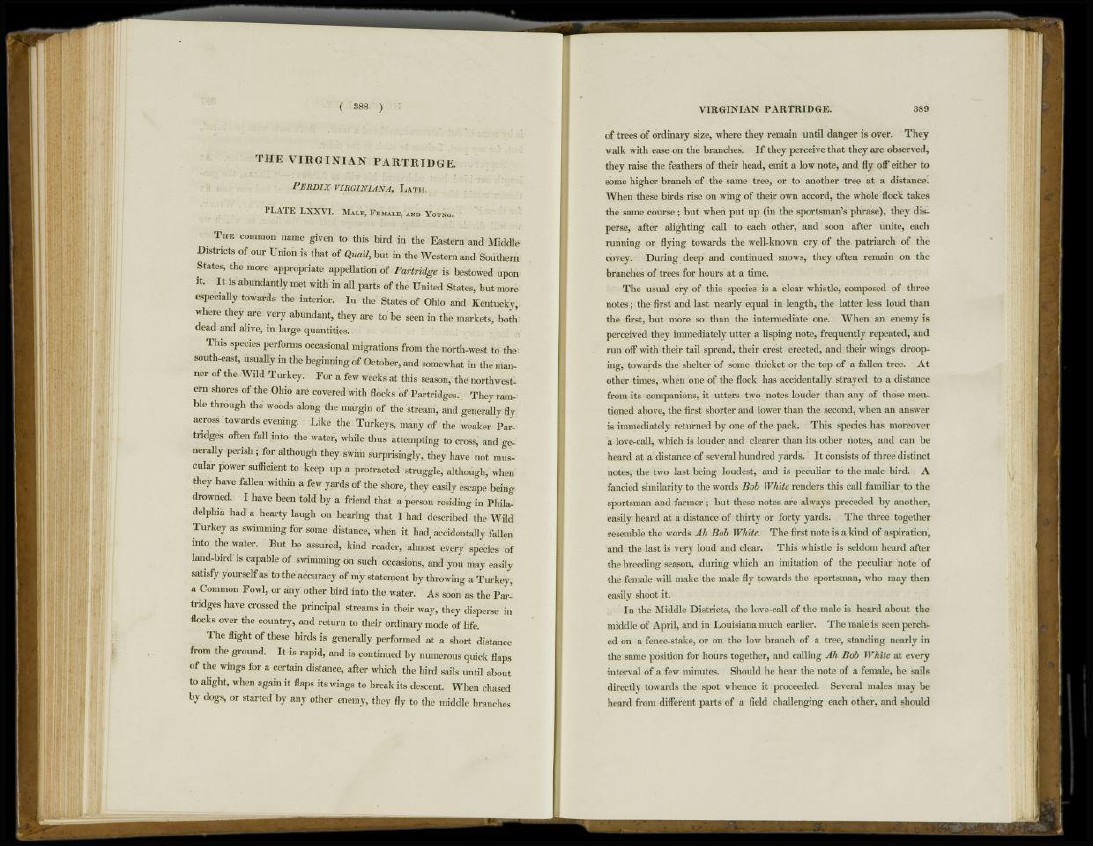
T H E V I R G I N I A N PARTRIDGE.
PERDIX VIRGINIANA, LATH.
P L A T E L X X V I . MALE, FEMALE, AND YOUNG.
THE common name given to this bird in the Eastern and Middle
Districts of our Union is that of Quail, but in the Western and Southern
States, the more appropriate appellation of Partridge is bestowed upon
it. It is abundantly met with in all parts of the United States, but more
especially towards the interior. In the States of Ohio and Kentucky,
where they are very abundant, they are to be seen in the markets, both
dead and alive, in large quantities.
This species performs occasional migrations from the north-west to the
south-east, usually in the beginning of October, and somewhat in the manner
of the Wild Turkey. For a few weeks at this season, the northwestern
shores of the Ohio are covered with flocks of Partridges. They ramble
through the woods along the margin of the stream, and generally fly
across towards evening. Like the Turkeys, many of the weaker Partridges
often fall into the water, while thus attempting to cross, and generally
perish; for although they swim surprisingly, they have not muscular
power sufficient to keep up a protracted struggle, although, when
they have fallen within a few yards of the shore, they easily escape being
drowned. I have been told by a friend that a person residing in Philadelphia
had a hearty laugh on hearing that I had described the Wild
Turkey as swimming for some distance, when it had accidentally fallen
into the water. But be assured, kind reader, almost every species of
land-bird is capable of swimming on such occasions, and you may easily
satisfy yourself as to the accuracy of my statement by throwing a Turkey,
a Common Fowl, or any other bird into the water. As soon as the Partridges
have crossed the principal streams in their way, they disperse in
flocks over the country, and return to their ordinary mode of life.
The flight of these birds is generally performed at a short distance
from the ground. It is rapid, and is continued by numerous quick flaps
of the wings for a certain distance, after which the bird sails until about
to alight, when again it flaps its wings to break its descent. When chased
by dogs, or started by any other enemy, they fly to the middle branches
of trees of ordinary size, where they remain until danger is over. They
walk with ease on the branches. If they perceive that they are observed,
they raise the feathers of their head, emit a low note, and fly off either to
some higher branch of the same tree, or to another tree at a distance.
When these birds rise on wing of their own accord, the whole flock takes
the same course; but when put up (in the sportsman's phrase), they disperse,
after alighting call to each other, and soon after unite, each
running or flying towards the well-known cry of the patriarch of the
covey. During deep and continued snows, they often remain on the
branches of trees for hours at a time.
The usual cry of this species is a clear whistle, composed of three
notes; the first and last nearly equal in length, the latter less loud than
the first, but more so than the intermediate one. When an enemy is
perceived they immediately utter a lisping note, frequently repeated, and
run off with their tail spread, their crest erected, and their wings drooping,
towards the shelter of some thicket or the top of a fallen tree. At
other times, when one of the flock has accidentally strayed to a distance
from its companions, it utters two notes louder than any of those mentioned
above, the first shorter and lower than the second, when an answer
is immediately returned by one of the pack. This species has moreover
a love-call, which is louder and clearer than its other notes, and can be
heard at a distance of several hundred yards. It consists of three distinct
notes, the two last being loudest, and is peculiar to the male bird. A
fancied similarity to the words Bob White renders this call familiar to the
sportsman and farmer; but these notes are always preceded by another,
easily heard at a distance of thirty or forty yards. The three together
resemble the words Ah Bob White. The first note is a kind of aspiration,
and the last is very loud and clear. This whistle is seldom heard after
the breeding season, during which an imitation of the peculiar note of
the female will make the male fly towards the sportsman, who may then
easily shoot it.
In the Middle Districts, the love-call of the male is heard about the
middle of April, and in Louisiana much earlier. The male is seen perched
on a fence-stake, or on the low branch of a tree, standing nearly in
the same position for hours together, and calling Ah Bob White at every
interval of a few minutes. Should he hear the note of a female, he sails
directly towards the spot whence it proceeded. Several males may be
heard from different parts of a field challenging each other, and should